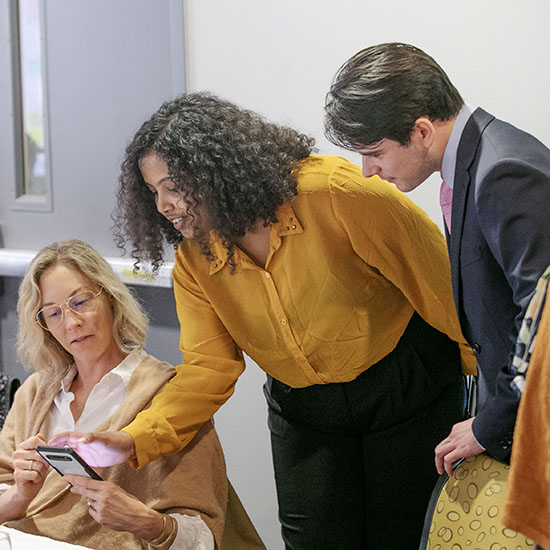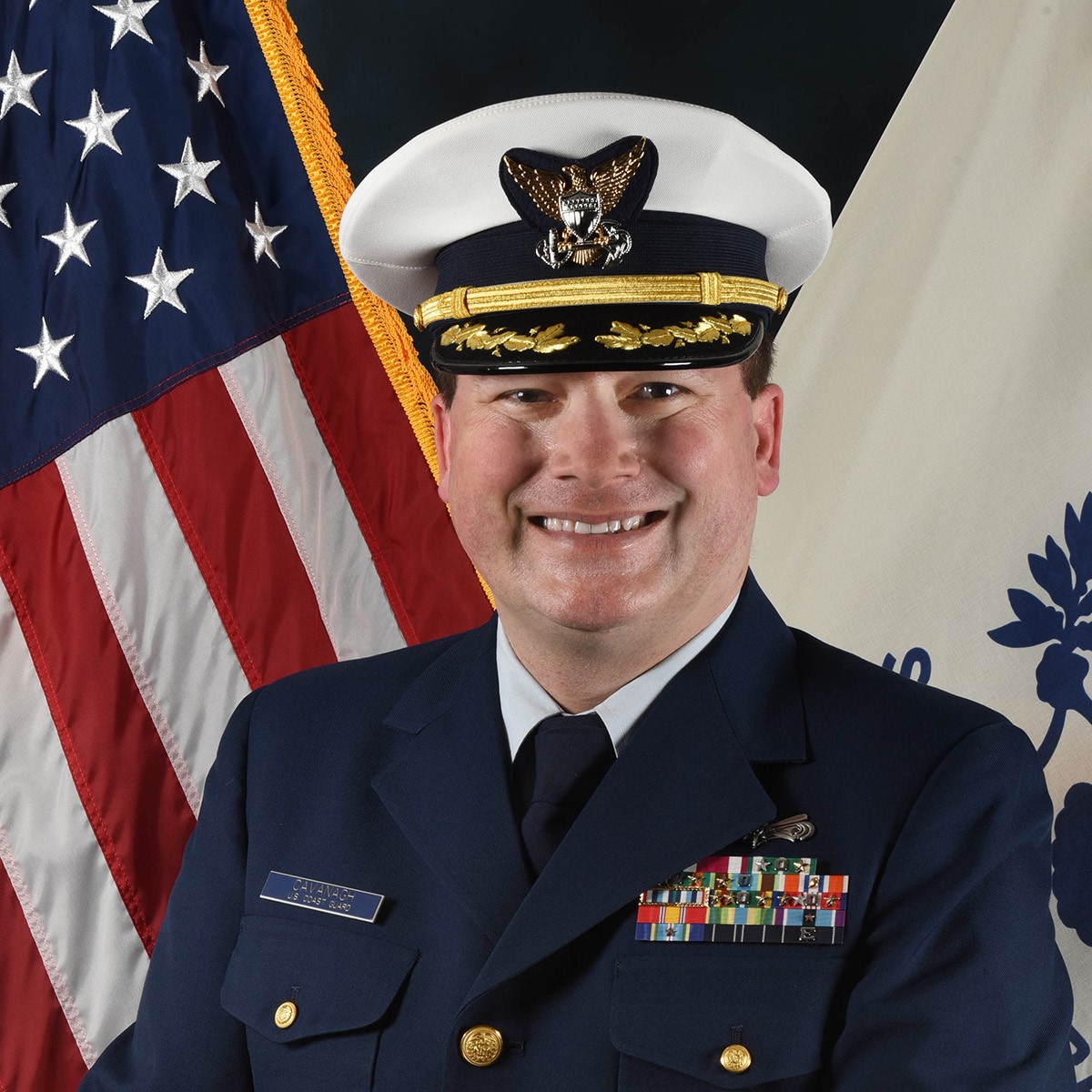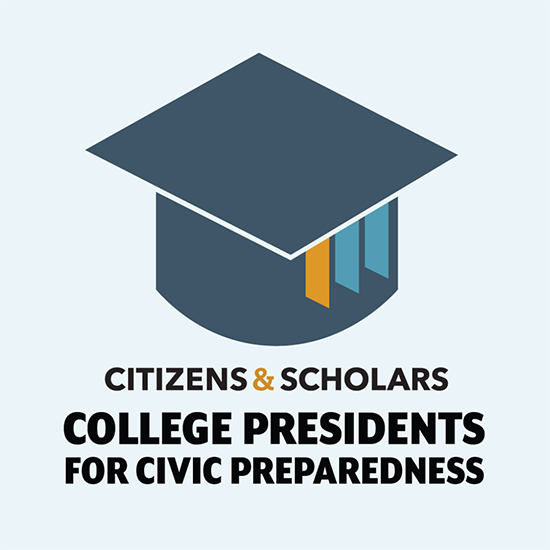Society for Neuroscience event draws Skidmore scholars
Three Skidmore students, along with three faculty at the College, got a taste of the neuroscience world in a big way when they attended and presented their research at the annual Society for Neuroscience (SfN) meeting in Washington, D.C., in mid-November.
The premier venue for neuroscientists from around the world to share cutting-edge research on the brain and nervous system, the annual meeting drew 32,000 scholars this year, including the following Skidmore representatives: Samuel Brook, Andrew Ross, and Elena Stansky, all Class of 2012; Jennifer Bonner, assistant professor of biology, Denise McQuade, senior teaching associate in biology, and Hassan Lopez, director of the neuroscience program. Ross and Brook each received a competitive travel grant awarded by the College and the SfN to underwrite their travel and conference expenses; Stansky also received a competitive travel grant from Skidmore.
Although Skidmore faculty have regularly brought students to the event, undergraduates are typically few in number and even fewer of them present original research, something not lost on the three Skidmore seniors who presented. "At first, I was a little apprehensive to present to people that had doctorates in the field, but the level at which Professor Bonner had taught us the material allowed me to engage in conversation at a professional level. It was the highlight of my undergraduate experience and a very rewarding feeling to get complements and respect from PhDs in neuroscience," said Ross.
His presentation focused on ethanol-induced axon pathfinding defects in the zebrafish, Danio rerio. Authors of the project included Cecilia Culp, Aleksander Krazinski, Zachary Knecht, and Bonner. Ross presented twice during the meeting, at a social for faculty of undergraduate neuroscience students and at a session titled "Effects of Alcohol on the Nervous System." Said Bonner, "Andrew presented to a continuous stream of interested scientists, some leaders in the field, for four hours."
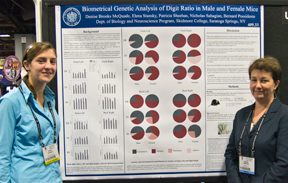
Stansky and McQuade with their research poster
Stansky was at SfN for the second time. She explained, "Last year I presented at the undergraduate poster session, so to present at the main poster session this year alongside PhD candidates and established researchers was truly amazing. The conference granted incredible exposure to different scientists and ongoing research projects from around the world, and was a great opportunity to network."
An exercise science major, Stansky has been involved with McQuade's ongoing investigations of digit ratio since her sophomore year. Last semester they conducted a biometrical genetic analysis of digit ratio in an attempt to measure the heritability of digit ratio in mice. This is the research they presented in Washington. Said Stansky, "In humans, digit ratio has been shown to be highly heritable due primarily to additive genetic effects. However we found that this did not hold true in mice. To the best of our knowledge, this is the first reported evidence for epistatic genetic (i.e. gene interaction) effects on digit ratio."
Research on digit ratio can provide scientists with clues to a wide range of health-related issues, including cancers affecting the breast or prostate, heart disease, and mental or psychiatric conditions, such as schizophrenia and autism.
McQuade places a high premium on attending conferences. "Participation at a large neuroscience conference like this is a wonderful opportunity for an undergraduate?. Opportunities to present to communities outside of Skidmore force the students to contextualize their research for unfamiliar audiences. Students benefit from seeing the types of research others are engaged in and from making networking connections. There are many talks and workshops that the students can attend, so they have access to cutting-edge information."
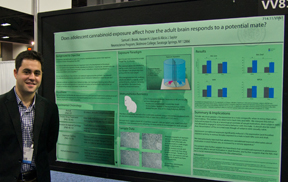
Sam Brook '12 at his SfN presentation
Brook's research, on which he collaborated with Lopez and Alicia Saylor, a post-doctoral teaching fellow in the Neuroscience Program, was titled "Does adolescent cannabinoid exposure affect how the adult brain responds to a potential mate?"
He developed this research last summer at Skidmore. Brook said, "It was myfirst opportunity to experience the entire process of designing and carrying out a research project. I could not imagine a more rewarding experience. What made it special was the feeling that I was working with my professors as a team, rather than as a subordinate. I felt free to share ideas and suggestions about design and methodology, a privilege not always afforded to undergraduate researchers."
Lopez, an associate professor of psychology at the College, explained, "Taking students to SfN is central to my teaching philosophy. I typically take students to SfN who have worked with me over the summer on collaborative research. They present at SfN, and I use the conference to try and connect them with post-graduate contacts. For example, Sam was meeting with National Institutes of Health investigators to hopefully work in their labs after graduation.
"I've taken former students who have met their future Principal Investigators and mentors at the conference. There's a lot of preparation. The research itself takes a long time. Sam spent hundreds of hours on this project. We work collaboratively in my lab, so other Neuroscience majors helped gather the data. We work together to generate the actual poster, and he presented it to our lab group before going."
Said Brook, "I was beyond excited to attend the conference and present our project as the first author in a professional setting. Presenting to our academic peers made me truly proud of the work we had done. I had the chance to meet and discuss my work with researchers whom my own advisor respects and looks up to, and this was intensely rewarding. This conference also functioned as a valuable networking experience for me."
SfN was a vehicle for students to showcase their work, but the work itself offered its own rewards, according to Stansky. "My experience as a student researcher at Skidmore has been more than I could ask for. Although I am an Exercise Science major, I get to be involved with the Biology and Neuroscience departments - gaining such a vast exposure to the science field is my favorite aspect of doing research with Professor McQuade. I never imagined I would be this involved with research, but it has provided me with valuable learning experiences that I will no doubt be able to translate into my life post-Skidmore. I plan on applying to medical school after Skidmore and believe that these experiences have prepared me for collaborating and working alongside others, and have strengthened my interest in the medical field."
Brook shared a similar perspective. "I am fortunate to have had the opportunity to attend this conference as an undergraduate. Skidmore's lack of graduate programs allows undergraduate researchers to collaborate and work directly with professors. As students gain more research experience in Skidmore labs, we often absorb responsibilities that might otherwise go to graduate students. I joined Professor L pez's lab group after taking his introductory NS course. During my first semester as a member of his lab group, I was amazed at how integral a role his students played in the planning and carrying out of his research. I remember being excited at the idea that I could earn that opportunity myself."
